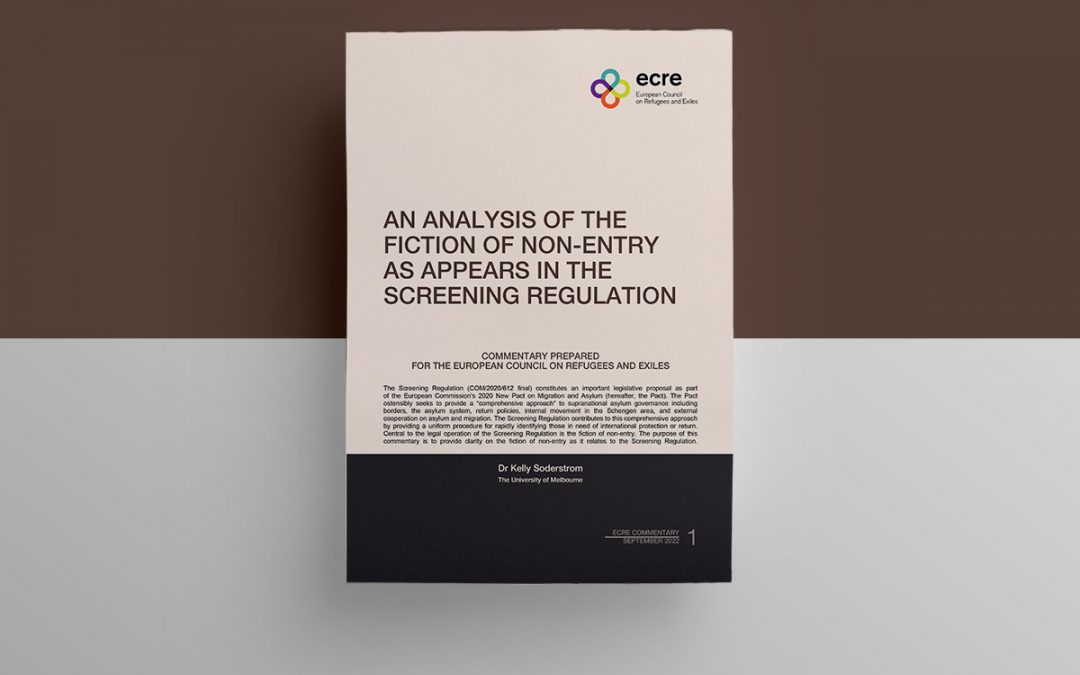ECRE has published a Commentary on the fiction of non-entry as included in the proposal for a Screening Regulation included in the Pact on Migration and Asylum. The Commentary which was commissioned by ECRE and written by Dr Kelly Soderstrom analyses the fiction of non-entry by providing an overview of the usage in Member State asylum governance and by providing an overview of the jurisprudence related to the fiction of non-entry. It then describes how the Screening Regulation would expand the usage of the fiction of non-entry and highlights what the implications of an agreement of the Screening Regulation with fiction of non-entry included would be.
The Commentary makes the following key arguments:
The Screening Regulation is a legislative measure proposed as part of the New Pact on Migration and Asylum. The regulation would put into place a uniform pre-entry screening procedure applicable to all third country nationals who arrive at an external border without fulfilling regular entry conditions. The screening consists of a health and vulnerability check, an identity check, registration of biometric data, and a security check.
The fiction of non-entry is a legally contested claim by states in which a third-country national can physically arrive in a country’s territory but does not legally arrive until she has been granted entry by an authorised border officer. Transit zones, such as those found in airports, are the most common use by states of the fiction of non-entry. The fiction of non-entry creates a liminal legal space where states exert control by restricting access to rights for third-country nationals. In the context of asylum, the fiction of non-entry inhibits asylum seekers’ mobility, access to rights and asylum procedures, and risks refoulement.
The Screening Regulation is ultimately the implementation of a supranational transit zone based in the fiction of non-entry. Asylum seekers must declare their application for asylum during the screening process, with the debriefing document provided to the asylum seeker at the conclusion of the process constituting a part of the asylum seeker’s protection application or justification for return.
The inclusion of another level of transit zone and additional screening at the supranational level further decreases asylum seeker agency in the process of seeking asylum by lengthening asylum pathways and curtailing their full access to a just and humane asylum procedure.
ECRE Commentaries present analysis and discuss specific issues related to asylum and migration. Their purpose is provide expert insights into particular topics of EU policy relevance. Commentaries are commissioned by ECRE; the views they contain are those of their authors and do not necessarily represent ECRE’s positions.
For further information:
- ECRE, COMMENTS ON THE COMMISSION PROPOSAL FOR A SCREENING REGULATION COM(2020) 612, November 2022
- ECRE, Policy Note SCREENING OUT RIGHTS? DELAYS, DETENTION, DATA CONCERNS AND THE EU’S PROPOSAL FOR A PRE-ENTRY SCREENING PROCESS, December 2022
- ECRE, Policy Note RELYING ON A FICTION: NEW AMENDMENTS TO THE ASYLUM PROCEDURES REGULATION, December 2020
This article appeared in the ECRE Weekly Bulletin. You can subscribe to the Weekly Bulletin here.

